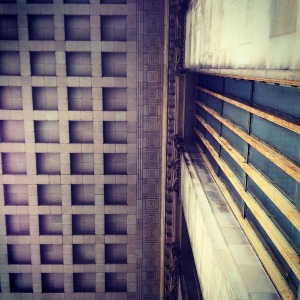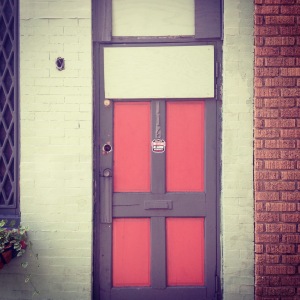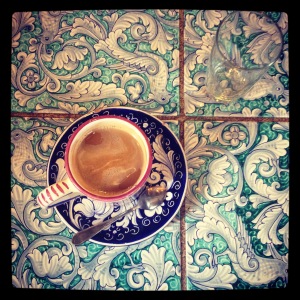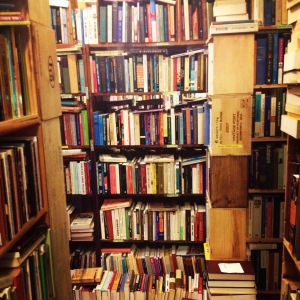“In our times we continually tend to assume that identity is the same as biography – that you are what has happened to you.”
– John O’Donohue, “Love is the Only Antidote to Fear”
This past spring, I stepped off a train in Philadelphia, my city of origin and where I spent the first twenty-two years of my life, and where I returned in May to play best man for my baby brother’s wedding. It was by no means my first visit back to the area since I left in the mid-1990’s. There have rather been extended, sometimes lengthy return trips to Philly over the years, even a handful of botched attempts to move back “home” in the two decades since I moved away. Since becoming a parent ten years ago, we’ve managed to make it back East for the holidays with some regularity, too.
This time, however, when I emerged from the underground cavern where the train dropped its passengers, my jaw went slack. I walked wide-eyed through the historic 30th Street station, where my father spent a lot of his career working for Amtrak, and I staggered stupefied in the direction of a street I years earlier could have found blind for how often I blew into and through the city. On this day, however, I felt mystified at best, thoughts racing as I moved through the bustling, aged station, wondering, “Since when did Philadelphia become so unfathomably beautiful?”
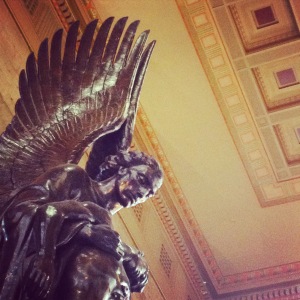
My thoughts stole to the scene at the end of The Lion, the Witch, and the Wardrobe which I had days earlier finished reading to my six year-old, Matt, in Alaska. Years following the White Witch’s defeat and aiding to free Narnia from her spell, and after assuming their rightful seats on the thrones at Cair Paravel, the four heroes go on a hunt for the enchanted White Stag. In its pursuit, Peter, Susan, Edmund, and Lucy come upon the lamppost that years earlier proved a marker in their first journeys beyond the wardrobe, a symbol bridging their lives between the war-ravaged “real” world they left behind and the magical land of Narnia they elected to explore and in which they courted adventure, and where they now presided as kings and queens.
The brothers and sisters spend a fair portion of the novel’s last pages comically puzzling over the lamppost, calling it a “pillar of iron,” “a lantern,” and “a strange device,” in such a way that reveals they have no recollection of it. Nevertheless, the appearance of it there works on Edmund “strangely,” and he says its presence runs in his mind “as it were a dream, or in the dream of a dream.”
As a child, this scene puzzled and mildly bugged me, and even after reading it to my two sons years apart it still annoyed me. Was Lewis trying to convince us that none of these four kids – not even Susan, the pragmatist – could remember their roots, where they came from, what other reality rested directly beyond the lamppost, through the cracked doors on the other side of the wardrobe? While I possess enough of a wild imagination to accept that there are magical worlds open for exploration, why did leaping into one grant you dementia or senility?
But as I wandered through and then out of the station, and soon made my way through the streets of a city I only ever dreamed of evacuating during the years that I grew up there, I swiftly understood the dim recollections of Lewis’s foursome in a new light.
For all the years I’ve lived away from Philly, my line in the script of how you and I come to know each other required that I at some point in the dialogue gloomily share that I’m from a working class neighborhood located a stone’s throw outside Philadelphia.
I could name the town, but I don’t have to. It’s that Every-/Anytown, the Xeroxed one you see in every movie or show depicting life in a lower-middle class suburb or neighborhood in America.
We had the requisite K-Mart, the Blockbusters, 7-11s, Dunkin’ Donuts, and all the fast food chains. Some of these businesses have swapped signage over the years, have magically turned into Targets or Olive Gardens, but this doesn’t suggest anything’s changed by a long shot.
Never mind that while I grew up there, I looked a lot like Napoleon Dynamite – but only if Napoleon Dynamite also battled severe acne. I also wore a headgear during the stage of development at which we’re most vulnerable and going all hormonally wonky inside. Although I dated (primarily, youth group) girls, the cool kids, the jocks at the small Christian school I attended felt overly inclined to call my friends and I “faggots” with an alarming and grave degree of frequency and ridicule. That school housed itself in what today still looks like an oversized version of your dad’s backyard aluminum storage shed.
Perhaps it was the rhythm of that backdrop, coupled with my unfortunate position in the social hierarchies we’re either gracefully or brutally assigned that punctuated or clarified my attachment to select songs dominating the airwaves on rock radio in Philadelphia then; songs like “Where the Streets Have No Name” (U2), “Born to Run” (the Boss), “Round Here” (Counting Crows), and one extended song I’ll only call “Anything by REM before Monster.” These songs and others became fuel for my future launch out of town, the soundtrack for the car in which I would speed towards the westward-setting sun when I rolled the credits on the pitiful melodrama of my first two decades.
The Philadelphia of my youth seemed defined by a polarizing awareness of an inconsolable isolation in the midst of what others around me so blithely embraced as familiar and true, or charismatically accepted as their birthright and rightful inheritance.
So, in all the years since I hit the road, Kerouac and Springsteen style, I’ve boldly and assuredly assumed I knew where I was from. I had my script so fine-tuned only Brando could improve on it.
But in a way similar to Peter, Susan, Edmund, and Lucy’s amnesiac regard of the lamppost in the woods of Narnia, I emerged from a train this summer and discovered I’d landed in an absolutely unfamiliar, barely recognizable, and – though roughly hewn – a beautifully and enviably designed city that happens to go by the name of Philadelphia.
That day, as I wandered the streets of a city I thought I knew – and for the duration of my three-week trip back “home” – never mind the claw marks with which I still frame the word – I discovered that I’d misplaced my script. Shortly after landing in the place I’m apparently from, I’d thoroughly and absolutely forgotten the lines I’d for so many years labored over and consigned to the expertly wrought grooves of habit and memory.
In other words, something I once assumed I knew inside out appeared in an unrecognizable moment as if “it were a dream, or in the dream of a dream.” And, for reasons I’m still puzzling over, the lay of the land instead appeared stunning and remarkably beautiful in every direction.
